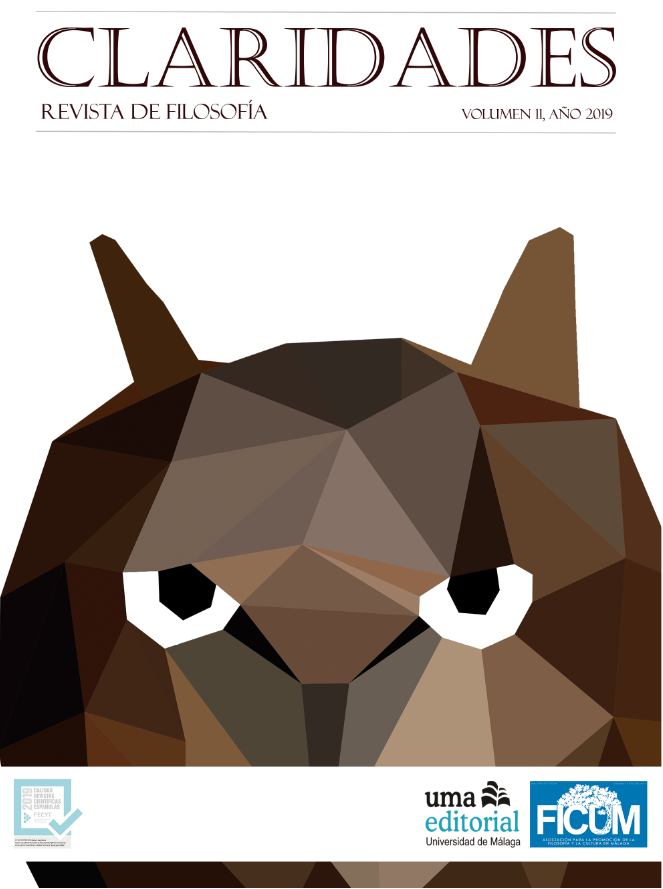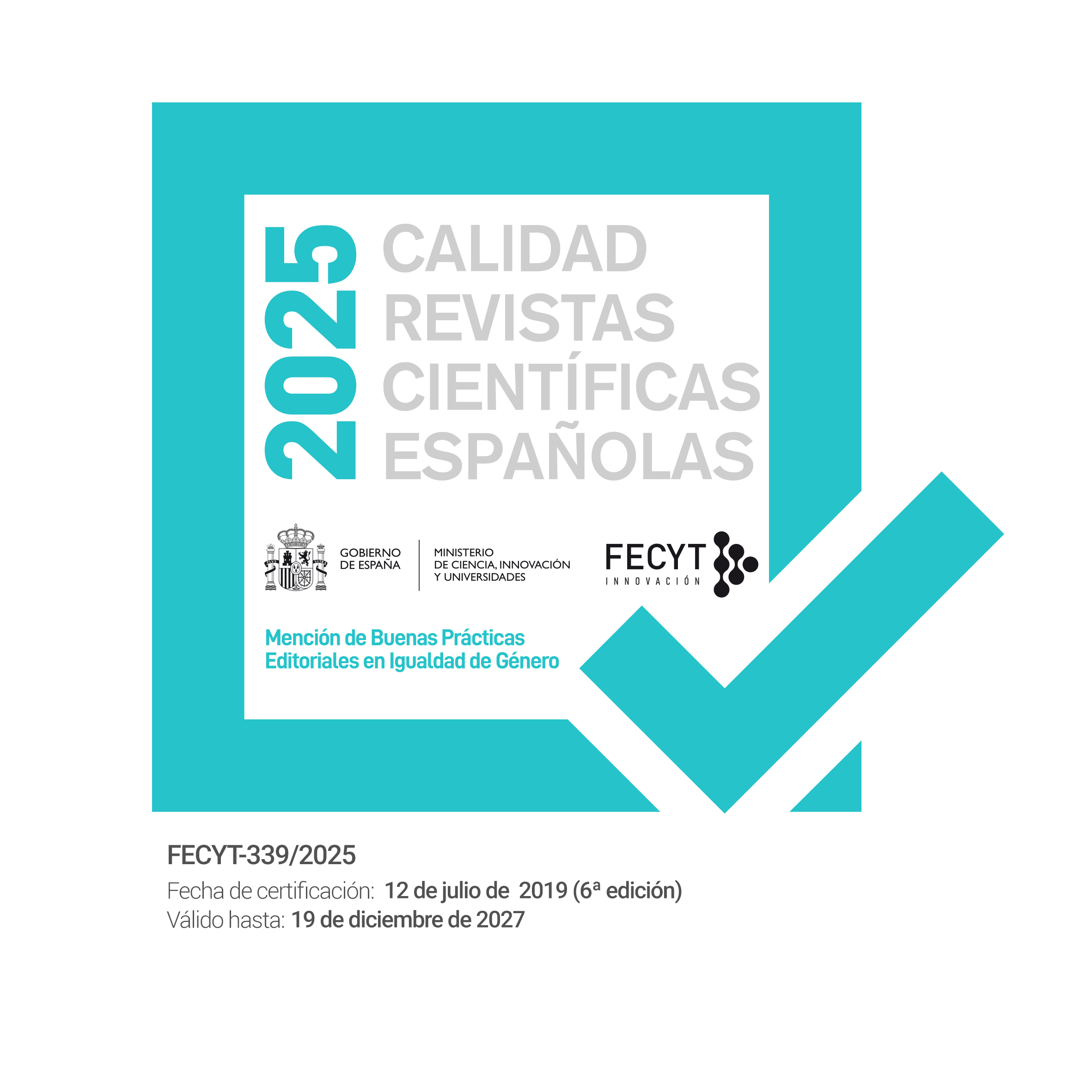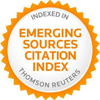Estudio comparado de la noción deweyana de naturaleza y los términos confucianos «xing» (?) y «tian» (?)
DOI:
https://doi.org/10.24310/Claridadescrf.v11i1.3949Palabras clave:
Ontología, Pragmatismo, Experiencia,Resumen
Este artículo trata de ampliar el enfoque de estudio de la noción deweyana de naturaleza mediante un análisis comparado con la concepción que Confucio propone en las Analectas. Siguiendo la metodología comparada desarrollada por los autores Roger Ames y David Hall, este estudio atiende a las cualidades que el filósofo estadounidense le atribuye a dicha noción en relación con los caracteres chinos xing y tian. El objetivo de esta aproximación no reside en poner de manifiesto similitudes forzadas, sino en enfatizar el contraste de ideas, las diferencias que distinguen los autores comparados. Obviamente, para establecer este diálogo estos filósofos deben compartir algunas ideas comunes y este será el aspecto significativo de esta comparación: subrayar las conexiones entre ambos filósofos, sin olvidar el contexto y los diferentes influjos desde los que estos dos pensadores desarrollan sus propuestas.Descargas
Métricas
Publicación Facts
Perfil de revisores N/D
Información adicional autores
Indexado: {$indexList}
-
Indexado en
- Sociedad Académica/Grupo
- N/D
- Editora:
- Asociación para la promoción de la filosofía y la cultura en Málaga (FICUM) y UMAEditorial
Citas
Analectas de Confucio. Trad. Chang Shiru. Beijing: Casa Editorial de Enseñanza e Investigación de las Lenguas Extranjeras, 2009.
Alexander, Th.: John Dewey’s Theory of Art, Experience and Nature. The Horizons of Feeling, Albany: State University of New York Press, 1987.
Campbell, J.: «Human Nature», Understanding Dewey, Illinois: Open Court, 1995, pp. 25-65.
Dewey, J.: «Nature and Its Good: A Conversation», en J. A. Boydston (ed.), The Middle Works of John Dewey, vol. 4. Carbondale: Southern Illinois University Press, 1910, pp. 15-30.
Dewey, J.: «As The Chinese Think», en J. A. Boydston (ed.), The Middle Works of John Dewey, vol. 13. Carbondale: Southern Illinois University Press, 1922, pp. 217-227.
Dewey, J.: Experience and Nature [1925], en J. A. Boydston (ed.), The Later Works of John Dewey, vol. 1. Carbondale: Southern Illinois University Press, 2008.
Dewey, J.: Logic. The Theory of Inquiry [1939], en J. A. Boydston (ed.), The Later Works of John Dewey, vol. 14. Carbondale: Southern Illinois University Press, 2008.
Dudley, W.: Understanding German Idealism. Durham: Acumen, 2007.
Emerson, R. W.: Nature. The Essential Writings of Ralph Waldo Emerson. New York: Modern Library, 2000.
Faerna García-Bermejo, A. M.: «De la naturaleza humana a la naturalizacion del hombre», en A. M. Faerna y M. Torrevejano (eds.), Identidad, individuo e historia. Valencia: Pre-Textos, 2003, pp. 113-139.
Faurfield, P.: John Dewey and Continental Philosophy. Carbondale: Southern Illinois University Press, 2010.
Feng, Y.: Selected Philosophical Writings of Fung Yu-Lan. Beijing: Foreign Languages Press, 1991.
Hall, D. A. y Ames, R. T.: Thinking through Confucius. Albany: State University of New York Press, 1987
Hall, D. A. y Ames, R. T.: Thinking from the Han. Self, Truth and Transcendence in Chinese and Western Culture. Albany: State University of New York Press, 1998.
Hahn, L. E.: Enhancing Cultural Interflow Between East and West: Collected Essays in Comparative Philosophy and Culture. Anhui: Thome H. Fang Institute, 1998.
Hickman, L. A.: Pragmatism as Post-Postmodernism: Lessons from John Dewey. New York: Fordham University Press, 2007.
Hickman, L. y Neubert, S. (eds.): John Dewey: Between Pragmatism and Constructivisim. New York: Fordham University Press, 2009.
Margolis, J.: «John Dewey’s Metaphysics of Existence», en J. De Groot, Nature in American Philosophy. Washington: Catholic University of American Press, 2004, pp. 138-156.
McDermott, J.: «Nature Nostalgia and the City», en The Culture of Experience. Philosophical Essays in the American Grain. New York: New York University Press, 1976, pp. 179-204.
Mougán Rivero, J. C: Acción y racionalidad. Actualidad de la obra de John Dewey. Cádiz: Universidad de Cádiz, 2000.
Perricone, C.: «The Influence of Darwinism on John Dewey’s Philosophy of Art», Journal of Speculative Philosophy 20:1, 2006, pp. 20-41.
Richardson Jr., R. D.: «Emerson and Nature», en J. Porte, S. Morris, The Cambridge Companion to Ralph Waldo Emerson. Cambridge: Cambridge University Press, 1999, pp. 97-105.
Rorty, R.: Consequences of Pragmatism. Hassocks: Harvester Press, 1982.
Ryder J.: American Philosophic Naturalism in the Twentieth Century. New York: Prometheus Books, 1995.
Santayana, G.: «Dewey’s Naturalistic Metaphysic» [1925], en J. A. Boydston (ed.), The Later Works of John Dewey, vol. 3. Carbondale: Southern Illinois University Press, pp. 367-384.
Schilpp, P.A. (ed.): The Philosophy of John Dewey. New York: Tudor Publishing Co., 1939.
Thayer, H. S.: Meaning and Action: a Critical History of Pragmatism. Indianapolis: Bobbs-Merrill, 1968.
Tu, W.: «The Continuity of Being: Chinese Visions of Nature», en J. Baird Callicott y Roger T. Ames, Nature in Asian Traditions of Thought: Essays in Environmental Philosophy. Albany: State University of New York Press, 1989.
Xinzhong Yao (ed.), RoutledgeCurzon Encyclopedia of Confucianism, New York: Routledge, 2003.
Yi King. Libro de las mutaciones. Trad de Charles de Harlez. Palma de Mallorca: José J. Olañeta editor, 2007, p. 57.
Descargas
Publicado
Cómo citar
Número
Sección
Licencia
Esta revista provee acceso libre inmediato a su contenido bajo el principio de hacer disponible gratuitamente la investigación al público. Todos los contenidos publicados en Claridades. Revista de Filosofía, están sujetos a la licencia Creative Commons Reconocimento-NoComercia-Compartirigual 4.0 cuyo texto completo puede consultar en <http://creativecommons.org/licenses/by-nc-sa/4.0>
Es responsabilidad de los autores/as obtener los permisos necesarios de las imágenes que están sujetas a derechos de autor.
Los autores/as cuyas contribuciones sean aceptadas para su publicación en esta revista conservarán el derecho no exclusivo de utilizar sus
contribuciones con fines académicos, de investigación y educativos, incluyendo el auto-archivo o depósito en repositorios de acceso abierto de cualquier tipo.
La edición electrónica de esta revista esta editada por la Editorial de la Universidad de Málaga (UmaEditorial), siendo necesario citar la procedencia en cualquier reproducción parcial o total.


















6.png)
